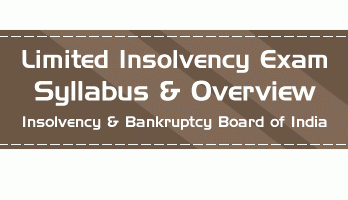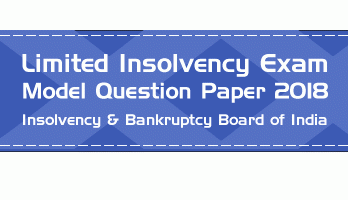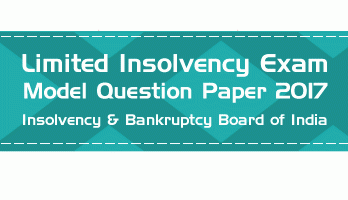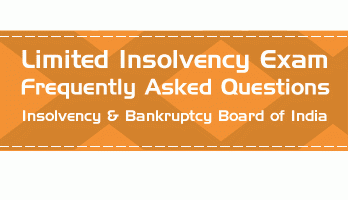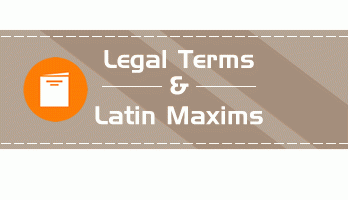76 Government of India may borrow upon the security of the
a) Consolidated Fund of India
b) Public Account of India
c) Contingency Fund of India
d) Fiscal Fund of India
Ans. (a)
77 Securities and Exchange Board of India does not regulate
a) securities
b) commodity derivatives
c) mutual funds
d) ULIPs
Ans. (d)
78 The Policy Repo Rate is the Reverse Repo rate.
a) higher than
b) lower than
c) equal to
d) 75% of
Ans. (a)
79 ‘Wages’ under the Minimum Wages Act, 1948 includes
a) house rent allowance
b) value of house accommodation
c) contribution by employer to any pension fund
d) travelling allowance
Ans. (a)
80 Which of the following is not true?
a) An insolvency professional must not engage in any employment.
b) An insolvency professional must refrain from accepting too many assignments.
c) An insolvency professional must not accept gifts which undermines his independence.
d) An insolvency professional must not accept more than one assignment from the same corporate applicant in a year.
Ans. (d)
81 Balance sheet of a company does not show
a) what the company owns and what the company owes
b) assets and liabilities of the company
c) financial health of the company
d) income and expenditure of the company
Ans. (d)
82 Basic Earnings per Share (EPS) is calculated by ..
a) net profit / total number of shares
b) (net profit -preferred dividend) / weighted average number of shares outstanding
c) (net Profit – preference share capital) / Average number of shares outstanding
d) (net Profit – dividend) / Total shares outstanding
Ans. (b)
83 Which among the following is not an essential feature of IFRS converged IND ASs (Indian Accounting Standard)?
a) Applicable to separate as well as consolidated financial statement
b) Give more importance to concept of substance over form
c) measurement not based on time value of money
d) disclosure of all relevant information and assumptions used
Ans. (c)
84 A firm can enhance its value by
a) increasing working capital.
b) increasing capital expenditure.
c) decreasing cost of capital.
d) Increasing debt.
Ans. (c)
85 Banks can freely provide Loans / Advances against
a) partly paid equity share of the companies
b) fixed deposits of other Banks
c) certificates of deposit
d) minted gold coins weight up to 50 gms per customer
Ans. (d)
86-90. Case Study:-
(a) A Ltd. (Company) is engaged in the manufacturing of Sponge Iron, TMT bars and Galvanized wires. It has availed various credit facilities from a total of 19 secured creditors with an outstanding debt of Rs.1500 crore. Due to adverse market conditions, its financial position took a downturn and hence it filed a reference with the Board for Industrial and Financial Reconstruction (BIFR). The reference was duly registered. During the proceedings before BIFR, one of the secured creditors, after taking consent of the other creditors of the company, filed an application for abatement of the reference before BIFR.
(b) Meanwhile, one of the unsecured creditors filed an application before BIFR for the impleadment in the proceedings. The BIFR dismissed the said application due to non-prosecution.
(c) Subsequently, upon coming into force of the Insolvency and Bankruptcy Code (IBC), 2016, the company filed an application for initiation of Corporate Insolvency Resolution Process (CIRP) before National Company Law Tribunal (NCLT) on 09.12.2016. However, in the first meeting of the Committee of Creditors held on 05.01.2017, the financial creditors of the company decided to liquidate the company. Immediately after this decision, but before intimating the decision to the NCLT, one of the financial creditors of the company applied to Resolution Professional (RP) giving proof of his claim and seeking his inclusion in the Committee of Creditors.
86. Can the creditors initiate SARFAESI action against the company?
a) Yes, if they constitute more than 75% of the total financial debt.
b) Yes, with the consent of the Liquidator.
c) Yes, with the consent of the National Company Law Tribunal (NCLT).
d) No, they cannot.
Ans. (d)
87. In case one of the secured creditors realises its security interest and such realization is not sufficient to pay its outstanding debts, can he recover the balance amount?
a) The balance amount will be ignored.
b) The balance amount will be paid at par with dues to the Central Government and the State Government.
c) The balance amount will be paid at par with other secured creditors.
d) The Balance amount will be paid at par with unsecured creditors.
Ans. (b)
88. In case the liquidation process is initiated, the unsecured creditor who filed an application before BIFR for impleadment shall be paid .
a) as per claim accepted by the liquidator in accordance with priorities specified in the Insolvency and Bankruptcy Code, 2016.
b) as per the amount of its claim before BIFR.
c) as per the amount of its claim made before the liquidator.
d) as per the order of Debt Recovery Tribunal.
Ans. (a)
89. In case the secured creditor faces resistance from company for enforcement of security interest, such secured creditor may apply to:
a) Adjudicating Authority
b) Debt Recovery Tribunal
c) Liquidator
d) High Court
Ans. (a)
90. What is the priority of payment to workmen dues in case of liquidation?
a) Pari passu with secured creditors and employees
b) Pari passu with secured creditors and insolvency costs
c) Pari passu with secured creditors
d) Pari passu with financial creditors
Ans. (c)


